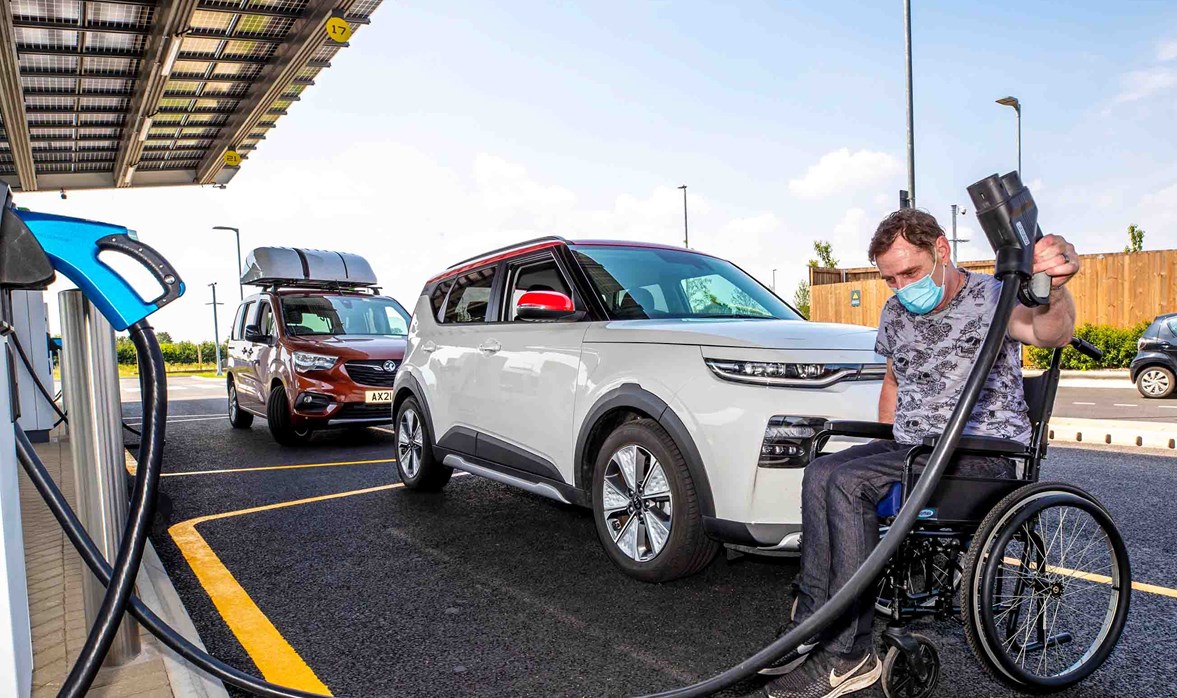As the nation moves closer to the ban on the sale of new petrol or diesel cars it is essential that electrical vehicle (EV) charging points are accessible for all drivers.
Supporting the work that Motability has been doing to address the lack of accessibility, Edmund King OBE, AA president has acknowledged the charity’s work ahead of speaking at the EV infrastructure summit, which provides a platform for industry leaders from key sectors to discuss the national zero-emission agenda. He said that he was “absolutely delighted that Motability has taken this several steps forward” and has called for more accessible charge points for electrical vehicles.
This call followed an AA-Yonder survey of 17,302 motorists which found that electric vehicle charging posts needed to be more accessible for the one in five people with disabilities.
The survey also highlighted that:
- 73% believed charge post spaces should be wheelchair friendly
- 79% noted that charge post design should consider users with limited mobility and/or physical disabilities
- 80% felt there should be access to a 24/7 call helpline
Motability is ensuring that disabled people are not left behind in the UK transition to electric, which is now just eight years away. The charity is working alongside fellow disability charity Designability, the British Standards Institution (BSI), the Office for Zero Emission Vehicles (OZEV) and UK Power Network and most importantly, disabled people, focussing on practical changes. This work will result in national standards that set a minimum level of accessibility for electric vehicle charging infrastructure. The BSI standards, sponsored jointly by Motability, the Charity and OZEV, are fully welcomed by the AA.
Catherine Marris, Head of Innovation at Motability, said: “There is a robust commercial and social case for ensuring that the transition to EVs is inclusive for disabled people. Our research with Ricardo estimates there will be 2.7 million UK drivers or passengers with a disability by 2035, with half reliant on public charging.
“It is therefore hugely important that disabled people are not left behind in the transition and that infrastructure providers avoid expensive retrofitting by building accessibility into charge point design at the start; following best practice and design standards will help.”
King said: “The AA has been raising the issue of accessibility and security at charging posts and polled members on it last year, but we are absolutely delighted that Motability has taken this several steps forward and are close to an approved standard.
“In simple terms, charging posts need to be well-lit, close to amenities, with space around the vehicle to allow people to use walking or mobility aids. It is also essential that the instructions, screen, and cables can be easily viewed and used from a sitting and standing position.
“Our experience on the EV Rally of Scotland brought it home to us that some people with limited mobility would struggle with the height and weight of cables particularly in enclosed areas with little space.
“Creating new charging posts that are easily accessible will not only benefit disabled drivers but will be a great help to our ageing population and indeed all drivers.”
To help raise awareness of the current issues with public EV charging for disabled people in the UK, we have produced a short video highlighting some of the points we aim to address.
To learn more about our research and the work Designability is doing with disabled people to inform our EV charging project, visit our research page.
If you are an organisation interested in collaborating with Motability on this project, or would like to find out more, please contact the innovation team, innovation@motabilityfoundation.org.uk.

